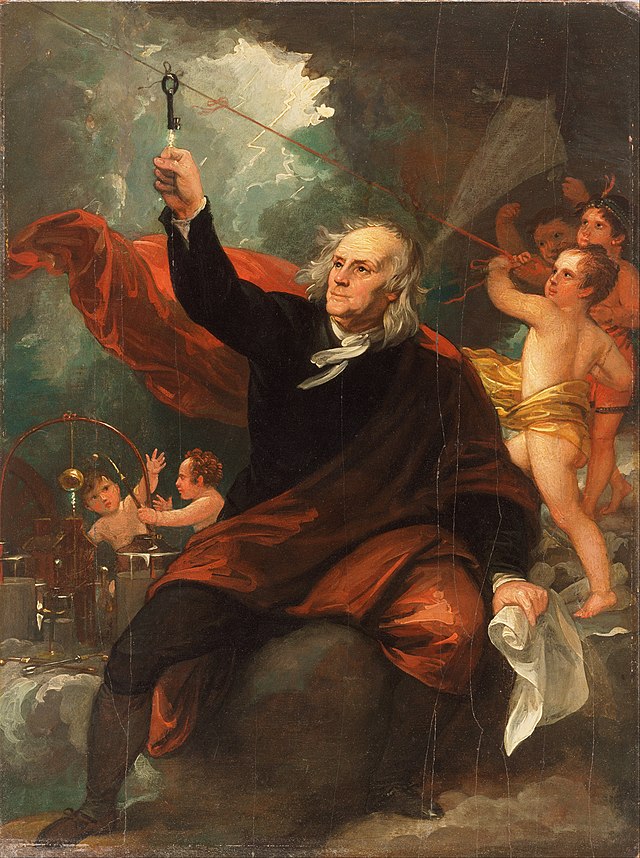A
student of philosophy might think that American philosophy sprang
straightaway from the heads of Charles Peirce and William James or
even that before Quine nothing of note happened at the other side of
Atlantic. Undoubtedly philosophy in America cannot have as long roots
as philosophy in Europe, but it still wasn't as recent innovation as
it might seem. Indeed, the
Founding Fathers of United States have often been described
as philosophers. Admittedly, they are far from systematic and
scholarly philosophers, and many of them might be better
characterised as men of letters, concerned with things like the relation of
an individual and a society and the role of religion in modern state.
Furthermore, instead of a theoretical framework, their main
achievement is of a more practical nature, that is, the constitution
of the independent United States of America.
 |
| Historically important, but where they philosophers? |
One
of the Founding Fathers, Benjamin Franklin, is especially famous for
having founded the American Philosophical Society. Yet, the name is
somewhat misleading, since by philosophy often all kinds of learning
were meant in those days. Thus, American Philosophical Society might
well be considered a republican version of the British Royal
Society. In this sort of philosophy Franklin was, of course, famous,
as is proven by the description of him often found in history text
books – holding a kite and waiting lightning to strike it.
 |
| At least the tale's good for dramatic portraits |
Franklin's
collected works take up ten volumes, getting to know which I am not
going to spend all my time, especially as Franklin seems to have no
clear major work engaged with philosophical issues. Instead, I chose
a short dialogue explicitly concerned with such philosophical issue
as good life. The dialogue was published, when Franklin was quite
young, so it should definitely not be seen as his final statement on
the topic.
The
participants of the dialogue are called Philocles and Horatio – I
am not sure if Franklin chose intentionally a Greek and a Roman
character or whether he just couldn't tell the ethnicity of the
names. Whatever the case, Horatio is clearly presented as a
traditionally Epicurean character, caring only about pleasures, while
Philocles opts for a loftier standpoint.
It
comes as no surprise that Franklin sides with Philocles. Yet, his
strategy is not to disparage pleasures altogether, but only to argue
for a hierarchy in pleasures: some pleasures are inherently better
than others (John Stuart Mill would later become famous for saying
something like that). Horatio of the dialogue, on the other hand,
assumes that there is no objective criterion for the worth of
pleasures and that everyone must decide for themselves what pleasures
are worth pursuing.
Franklin
lets Philocles attack Horatio by stating that certain pleasures will
lead to unwanted consequences: a man spending all his money and
health on intense sensual pleasures will become economically and
physically broke in very young age and have no viable alternative,
but commit a suicide. This unwanted end can be prevented, Philocles
continues, only through self-denial, that is, by avoiding such
intense pleasures. Further in the dialogue, in its second part,
Philocles then sets out his own alternative: while sensuous pleasures
are always fleeting, altruistic pleasures arising out of helping
other people are lasting and should thus be pursued.
One
can at first point out that Franklin's dialogue is far from a
theoretical work on metaethics, but instead is very down-to-earth,
discussing practical mores and not high-blown principles. Even more,
the outlook of Franklin is utilitarian: what makes altruism viable is
the pleasure it produces. While I find sympathetic a position that
defends altruism for increasing pleasure (altruist is happy not just
of his own good luck, but also of the good luck of others),
Franklin's argumentation has still some glaring holes. He
concentrates on good works improving the condition of others. But
what if everyone already lives in a content state, how then to
improve their condition? Furthermore, it seems obvious that such an
altruistic enjoyment is dependent on the enjoyment of another human
being and that ultimately this series of enjoyment must end in some
independent enjoyment, which does not depend on enjoyment of another
human being – that is, non-altruistic enjoyment. In other words,
while altruism can multiply pleasure, it cannot be its only source.
Even
more suspect is the argumentation in the first part of dialogue.
Franklin want us to conclude that a short life full of intense
pleasures is inherently worse than a long life with less intense
pleasures. Yet, if the only criterion of the worth of a life is its
pleasantness, it could well be that a sum of intense pleasures during
a short life would exceed a sum of less intense pleasures during a
long life – just like a rectangle with a short base and a long
height could have greater area than a rectangle with a longer base,
but shorter height.
Furthermore,
Franklin's suggestion that it is always better to deny some pleasure,
if it leads to better life in the future, is somewhat misleading.
Consider a person who always leaves half of his year's earnings
unused, in order to have a decent fortune that would sustain him in
his old years. If this person dies now in his sixtieth year, without
ever having used the fortune he had collected, the fortune never
really served him, and on the contrary, he had to life a paltry life
because of his savings.
This
is all I'll say about the dialogue. Next time I shall turn my eyes
from the Founding Fathers of USA towards thinkers of French
Enlightenment.
Ei kommentteja:
Lähetä kommentti